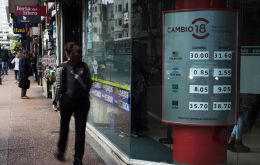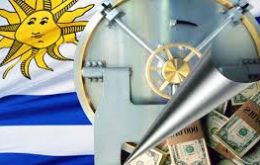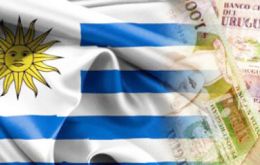MercoPress. South Atlantic News Agency
Tag: Mario Bergara
-
Monday, May 12th 2025 - 10:59 UTC
Uruguay’s municipal elections: National Party dominates, Frente Amplio retains Montevideo

Uruguay’s 2025 municipal and departmental (provincial) elections concluded with results reinforcing the country’s traditional political landscape. The left-wing Frente Amplio retained its stronghold in Montevideo and Canelones, while the center-right National Party (Partido Nacional) maintained its dominance across most rural regions, securing a total of 13 departments.
-
Thursday, June 20th 2019 - 09:59 UTC
Uruguay holding presidential primaries on 30 June: three main candidates outstand

The last Sunday of June Uruguay will be holding presidential primaries when political parties will be choosing their candidates for the coming election scheduled for next October. There are over a dozen hopefuls, but only three, maybe four or five can be considered sufficiently strong as to be taken into account. After all from one of these parties will come the next president of Uruguay, since there is no consecutive reelection in Uruguay.
-
Thursday, May 17th 2018 - 09:10 UTC
The dollar falls in Argentina while in Uruguay the rise “does not worry”

The recent rise of the dollar in Argentina had some impact in Uruguay, where it has an accumulation of 7.4% in May. However, for the president of the Central Bank of Uruguay, Mario Bergara, the escalation only owes 20% to the exchange rate in Argentina and rather considers that Uruguay is accompanying global trends.
-
Thursday, April 6th 2017 - 12:53 UTC
Uruguay's March inflation finally drops to the Central bank target range

Consumer prices in Uruguay rose 0.68% in March, the government said in a statement on Wednesday, bringing the country's 12-month inflation rate to 6.81%. It was the first time since December 2010 that Uruguayan inflation was within the country's 3% to 7% target range.
-
Wednesday, September 23rd 2015 - 07:17 UTC
Uruguay pumps greenbacks to keep the US dollar rate on sliding stability

Uruguay's central bank was forced to sell almost 65 million dollars on Tuesday, the highest volume so far this year, to keep the US dollar from ballooning as fears of the collapse of the Brazilian economy are felt through the region. The dollar finally ended trading with a slight 0.12% increase at 28,826 Pesos to the greenback.
-
Thursday, May 7th 2015 - 06:01 UTC
Uruguay's economy 'strong enough' to navigate in challenging environments

Uruguay's economy is “strong enough to navigate in a challenging global and regional environment” in which the U.S. dollar is strong and inflation is starting to rise, Uruguayan Central Bank, (BCU), chairman Mario Bergara said during a conference in Montevideo where he discussed the central bank's mission in the current world environment.
-
Tuesday, December 30th 2014 - 07:53 UTC
Uruguay watching Russia's 'perfect storm' closely

Uruguay's Economy Minister Mario Bergara and Vicepresident Danilo Astori agree on how Russia's situation will affect the South American country's trade balance and whether it may or may not have a direct impact on beef exports.
-
Friday, December 26th 2014 - 00:59 UTC
Uruguay's Economy Minister skeptical on ARU study

Consumers could have saved as much as US$ 167 million had fuel been imported directly instead of oil being refined by ANCAP. Mario Bergara deems it to be “overblown”
-
Wednesday, June 4th 2014 - 09:03 UTC
Timid S&P ignores Moody's and leaves Uruguay' risk rating unchanged

Standard & Poor's (S&P) decided on Tuesday to maintain Uruguay's sovereign debt risk rating unchanged at the lowest investment grade BBB-, because although it has solid growth prospects, predictable policies and a favorable debt profile, the country still has limited fiscal and monetary flexibility and lives in a neighborhood experimenting 'economic stress'.
-
Wednesday, May 14th 2014 - 05:08 UTC
The very good reasons to invest in Uruguay, according to Minister Bergara

Minister of Economy Mario Bergara addressed on Tuesday the US Chamber of Commerce in Washington and said Uruguay was a good place to invest because despite being a small market, it was a good launching pad to develop in the region.
